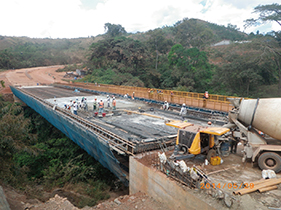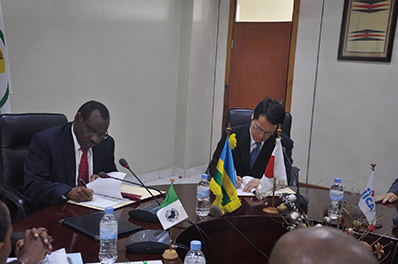Stories from the Field 6
Strengthening Regional Connectivity and Promoting Logistics between Rwanda and its Neighboring Countries!
—Contributing to economic development across East Africa through comprehensive assistance unique to Japan—

New bridge named Rusumo International Bridge under renovation (Photo: JICA)

Signing of the Exchange of Notes (E/N) for the Rusumo-Kayonza Road Improvement Project (Photo: JICA)
Rwanda has seen continuous economic growth since the end of the civil war in the first half of the 1990s. However, the deterioration of its road transportation infrastructure and the cost of cross-border customs clearance have become problems for the country. The transportation routes in eastern Rwanda are part of the main international transportation corridor*1 of the East African region, and repairing the deteriorated bridges and roads and improving border control capacity will help to strengthen regional connectivity and promote economic development across East Africa.
In 2016, Japan recommenced loan aid to Rwanda for the first time in approximately 30 years with the inauguration of the Rusumo-Kayonza Road Improvement Project, under the Accelerated Co-Financing Facility for Africa (ACFA) of the African Development Bank (AfDB). In this project, the entire length (208 km) of the Central Corridor*2 will be repaired and widened in cooperation with the Government of Rwanda, AfDB, and the European Union (EU). Japan will provide assistance for work on the Rusumo-Kayonza section (92 km), which connects Rwanda and Tanzania, and will promote the further development of infrastructure over a wider area and improvements to logistics infrastructure.
Japan has been working to resolve issues relating to overland transportation in Rwanda, a landlocked country. Japan built the new Rusumo International Bridge between Rwanda and Tanzania and enabled safe two-way movement through the Project for Construction of Rusumo International Bridge and One Stop Border Post Facilities, a grant aid project that started in 2011. At the same time, Japan also developed One Stop Border Post (OSBP),*3 to facilitate smoother customs procedures, thereby contributing to the reduction of transportation costs and expansion of trade and investment between the two countries.
Mr. KAMEDA Hitoshi, who oversaw the work as a consultant for grant aid, said that it was not an easy task to carry out the project in two countries at the same time. He recalled that relations between Rwanda and Tanzania were sore at the time and said, “We had to make sincere efforts to deal with the issues one by one, including giving patient explanations to both governments and taking care to ensure that the locally employed workers were able to do their work within the borders of their own respective countries.” The ex-post evaluation found that the customs clearance capacity of Rusumo International Bridge increased approximately three-fold compared to before the construction. The subsequent loan aid this time will enhance further the impact of Japan’s assistance that has been implemented to date.
In addition, Japan has been providing the technical guidance needed for the operation of the newly-introduced OSBPs through the “Project on Capacity Development for Trade Facilitation and Border Control in East Africa,” a technical cooperation project that began in 2017. In this project, Japan worked in partnership with experts from the World Customs Organization (WCO) to streamline customs clearance procedures and develop border protection capabilities by capacity development of customs staff in the East African Community (EAC).*4
In this way, such comprehensive support that combines a variety of schemes in the form of loan aid, grant aid, and technical cooperation, is one of the strengths of Japanese development cooperation. Ms. UJIIE Kazuho of JICA Africa Department said “Co-financing with AfDB and technical cooperation with WCO is bringing about major impacts. I hope that the outcomes of our multiple projects in Rwanda will contribute to economic development throughout East Africa.”
*1 A major highway that is central to national and regional economic activity.
*2 The corridor that continues from Rwanda through Tanzania to the Dar es Salaam Port, for the purposes of transporting the cargo of landlocked countries.
*3 A form of administration of customs clearance that makes cross-border logistics more efficient by sharing and integrating all the procedures for imports/exports, which normally need to be carried out separately by the customs offices of both the importing and exporting country, thereby enabling them to be done in a single session.
*4 An economic community comprising six member states: Burundi, Kenya, Rwanda, South Sudan, Tanzania, and Uganda.
<< Previous Page Next Page >>
Main Text | Reference Statistics | Stories from the Field | Master Techniques from Japan to the World | ODA Topics
